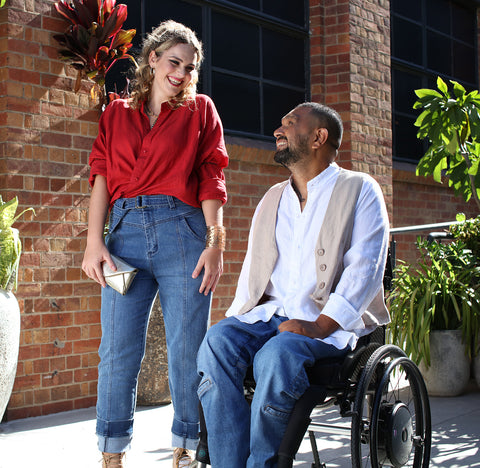Jess chats to Marie Claire about "work"
Jessie sat down with Bron Bates from Marie Claire to chat about how she abandoned her high flying corporate gig, in favour of work with meaning. The secret? It all starts with making THE list.
Jessie Sadler was working successfully at a corporate job in the city when she realised one day that she didn’t want to go back. Sometimes she felt she was just a cog in the wheel, delivering KPIs and working for goals that served someone else’s mission, not her own. Change was calling.
She wanted to work for herself but wasn’t sure what she wanted that work to be. So, Jessie set about making change – starting with a list. “It was literally five or ten dot points about what I wanted to do in my next career,” she says. “I like working in an international business capacity. I like making my own decisions. I was looking at a food enterprise or a fashion enterprise.”
Inner Confidence
In her past jobs, Jessie had loved working internationally, and learning how other cultures conducted business had been a highlight. She’d also undertaken an MBA (Master of Business Administration) at The University of Queensland (UQ), which took her to China and East Timor on different projects. “It is an amazing experience,” Jessie says. “And incredible friendships were formed … so when I was thinking about my career change, working in an import or export or international business capacity was on the list of important things for me to include in my job,” says Jessie. “
New Direction
The idea for her new career came from an unlikely turn of events. Jessie was out shopping with her mum when her mother fell over, seriously injuring both her elbows. “After that, lifting her arms and her mobility was an issue,” says Jessie. She quickly found that shopping for clothes for her mum that were accessible and stylish was a problem. “What we found in the fashion market was really underwhelming.” Thus, the inspiration for Jessie’s new business was born. She looked back at her checklist and realised she could put her goals into action and address the problem of adaptive fashion in the process.
Finding Meaning
In 2020, Jessie’s adaptive fashion label Christina Stephens was born. Then in May 2022, Jessie brought in her business partner, Carol Taylor, the world's first quadriplegic fashion designer. “It's a very good feeling to be in this space,” says Jessie. “And Carol’s lived experiences as a woman with quadriplegia and connections into the disability sector have definitely helped evolve the business into what it is now."
Today, Carol takes the design wheel, and Jessie looks after the business growth. “We manufacture in multiple locations in China and Pakistan, and this component of dealing with manufacturers in the international arena is really enjoyable for me.”
“I love my new career. It’s all-consuming. When you have your own business, you pour your heart and soul into it … and I have a close relationship with Carol as a friend and as my business partner. I think being able to launch an adaptive clothing label and bring a truly needed product to a market that has been grossly under-serviced for forever is really satisfying.
“We're not just bringing product to market for the sake of fast fashion and more product. Our service and products are greatly needed in all geographic markets, but particularly needed in the disability space."

5 Tips On Turning Your Working Life Around (From Someone Who’s Done It)
1. Think about what's meaningful to you
If you’re not sure what career you want to change to, ask yourself what brings YOU meaning because, ultimately, you’ll enjoy work more if it’s meaningful to you. “I could've gone into fashion and just designed and made clothing for the fast fashion market, which would've added to the landfill issues and high consumption of fashion that already exists,” says Jessie. “But I think going into fashion, which is something I enjoy, in an area where a new type of clothing is actually needed, makes the career change more meaningful.”
2. Write Down What You Want
Physically putting pen to paper is an important step. It helps you clear your head so that the change you're making is something that’s concrete to you. Be very clear about what you want to get out of your career now and in the future. When you write goals down, it becomes easier to put a plan in place to make them happen.
3. Manage Your Finances
Work out a plan so that you can afford your career change. Making a shift can take time, and initially, it can be an expensive exercise. Jessie says, “Particularly if you’re choosing to work for yourself, you may need to organise your finances to give yourself enough buffer to handle a lower income for a while. Obviously, with a startup or a new business, positive cash flow may take some time. Or you may need to take a pay cut to move into a new area of work.”
4. Take Care Of Yourself
If your career change involves starting your own business, know this route can be all-consuming and stressful. Put boundaries in place to look after yourself and maintain a healthy work/life balance. Prioritise spending time with your family and friends because those relationships will keep you going longer.
5. Look at your strengths
Consider making a meaningful career change into an area where your skills and experience will be best utilised for a positive outcome. If you're missing a skill set or need more education to make that happen, you can start preparing for that. Investing in further education, like an MBA, can help you develop the skills and experience you need to take the next step in your future.
























